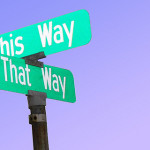We run our website the way we wished the whole internet worked: we provide high quality original content with no ads. We are funded solely by your direct support. Please consider supporting this project.

How People Misunderstand Open Theism
Open theism holds that, because agents are free, the future includes possibilities (what agents may and may not choose to do). Since God’s knowledge is perfect, open theists hold that God knows the future partly as a realm of possibilities. This view contrasts with classical theism that has usually held that God knows the future exclusively as a domain of settled facts. There are no “maybes” for God.
The debate is not about the scope and perfection of Gods’ knowledge, for both open theists and classical theists affirm God’s omniscience. God always knows everything. The debate, rather, is about the content of the reality God perfectly knows. It comes down to the question of whether or not possibilities are real.
I’m always puzzled as to why many defenders of the classical theism spin the debate with open theists as a disagreement over the perfection of God’s knowledge. For example, they publish books with titles like How Much Does God Know? (Steven Roy) and What Does God Know and When Does He Know It? (Millard Erickson). Since open theists believe God always knows everything, why do they continue to argue as if we don’t?
Part of the explanation, of course, may be simple propaganda. My sense is that, while spinning the debate as about God’s knowledge rather than the nature of reality certainly is advantageous for the purpose of propaganda, the critics who argue this way also seem to sincerely believe what they’re saying. How can this be?
While researching some ancient philosophers who influenced theologians like Augustine and Boethius, I uncovered something that may help explain this curious phenomenon. Let me briefly explain.
First, Plato argued that we see not by light entering our eyes (as we now know is the case) but by light proceeding out of our eyes (Timaeus 45b). For Plato, seeing is an active, not a passive, process. Since knowledge was considered to be a kind of seeing, Plato also construed knowing as acting on something rather than being acted upon (Sophist 248-49). I’ve discovered that this mistaken view of seeing and knowing is picked up and defended by a host of Hellenistic philosophers.
Second, several Neoplatonistic philosophers (Iamblichus, Proclus and Ammonius) used this theory of eyesight and knowing to explain how the gods can foreknow future free actions. They argued that the nature of divine knowledge is determined not by what is known but by the nature of the knower. Since they assumed the gods were absolutely unchanging, they concluded that the gods knew things in an absolutely unchanging manner, despite the fact that the reality the gods know is in fact perpetually changing. This allowed them to affirm that the future partly consisted of indefinite (aoristos) truths (viz. open possibilities) while nevertheless insisting that the gods knew the future in an exhaustively definite, unchanging way.
The view is, I’m convinced, completely incoherent. But one can understand how these philosophers arrived at it in light of their mistaken assumptions about seeing and knowing as wholly active processes. What the gods see when they look at the future conforms to the unchanging nature of the gods rather than the changing nature of the future they see. Through the influence of Augustine and especially Boethius (who explicitly espoused the ancient view of seeing and knowing and repeated some of the Neoplatonic arguments), this way of “reconciling” foreknowledge and free will quickly established itself as the dominant view in the Christian tradition.
And it is, I suspect, this same mistaken tradition that at least in part explains why many contemporary defenders of classical theism today instinctively assume the debate over open theism is a debate about the nature and perfection of God’s knowledge rather than a debate about the nature of the future.
Once we abandon the ancient view of seeing and knowing as active processes, it becomes clear that God’s knowledge is perfect if, and only if, it perfectly conforms to the nature of what is known. So if possibilities are real, then God’s knowledge is perfect if, and only if, God knows them as possibilities. Contrary to what critics of open theism claim, open theists affirm that God always knows everything perfectly. It’s just that we have reason to believe a partly open future is part of what God perfectly knows.
Image by SortOfNatural via Flickr
Category: General
Tags: Calvinism, Divine Foreknowledge, Free Will, freedom, Future, Open Future, Open Theism
Topics: Free Will and the Future, Open Theism What it is and is not
Related Reading

How Could God Foreknow Peter’s Choice but not Abraham’s? (podcast)
Greg looks at the nature of God’s foreknowledge and testing. Episode 562 http://traffic.libsyn.com/askgregboyd/Episode_0562mp3.mp3

Tragedy Strikes and Coherence Goes Out the Window
I encourage you to read Aurora shooting inspires various perspectives on God and belief, written by Electa Draper and published on the front page of the Denver Post Monday. The article shows how differently believers process tragedies, and illustrates the centrally important role one’s picture of God plays in these responses. For today, I’d like…

Predestination Part 2: Seeing Destiny Rightly
For Part 1, click here. In Ephesians Paul teaches that God “chose us in [Christ] before the creation of the world to be holy and blameless in his sight” (Eph 1:4). In Christ, Paul continues, God “predestined us for adoption to sonship…to the praise of his glorious grace, which he has freely given us in…

Open Theism and the Nature of the Future
In this philosophical essay Alan Rhoda, Tom Belt and I argue that the future cannot be exhaustively described in terms of what will and will not happen, but must also be described in terms of what may and may not happen. The future, in other words, is partly open. The thesis is defended against a…

Podcast: Will We Have Free Will in Heaven?
Greg discusses the afterlife and the type of freedom we might have there. http://traffic.libsyn.com/askgregboyd/Episode_0103.mp3

What Unfulfilled Prophesies Say About the Open View
Image by Lori Greig via Flickr Yesterday, we posted about how Messianic prophesies are understood in the open view of the future. Today, this post will look at prophesies that are not fulfilled in the way predicted and what that can tell us about the open view of the future. In John Goldingay’s excellent multi-volume work, Old…
